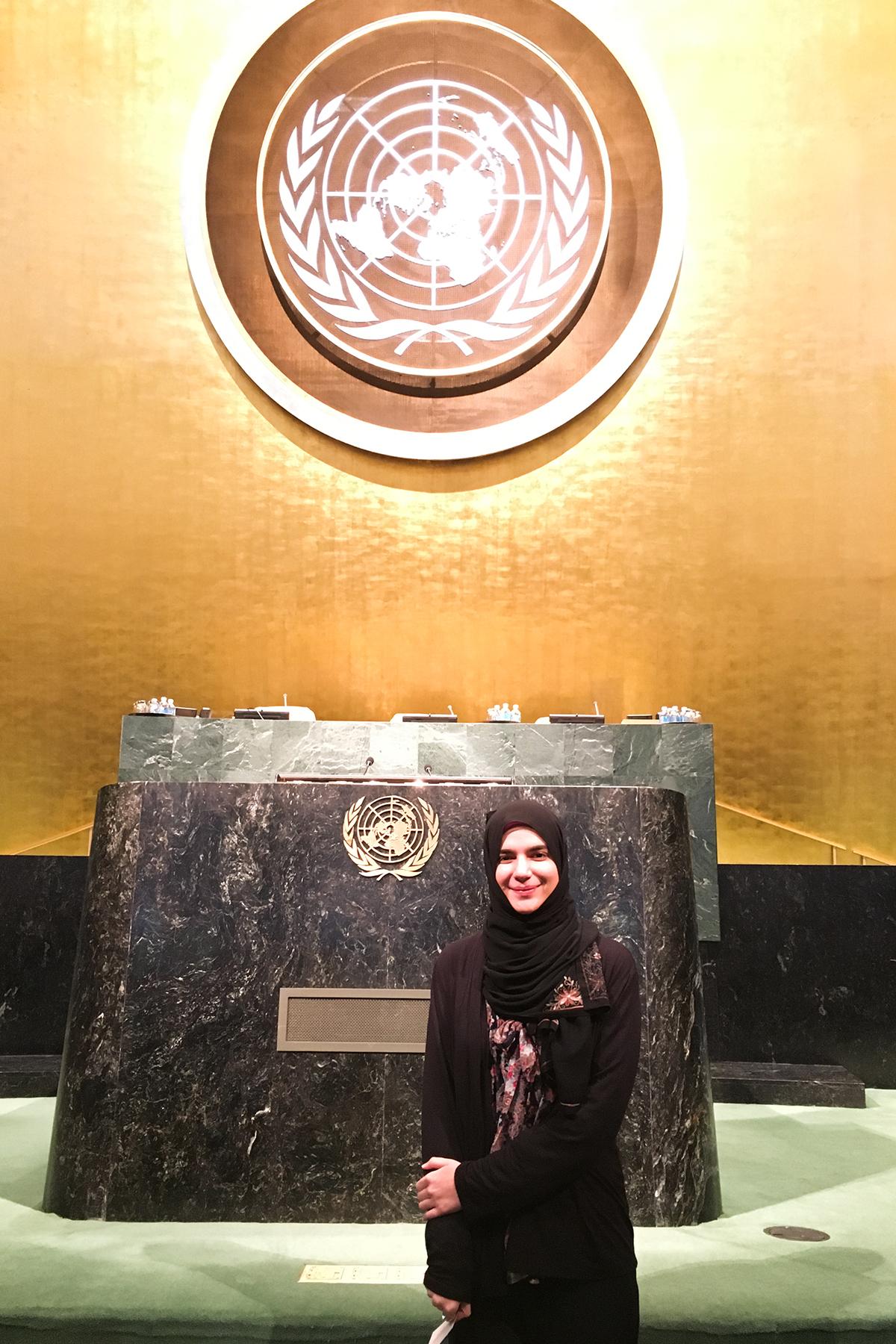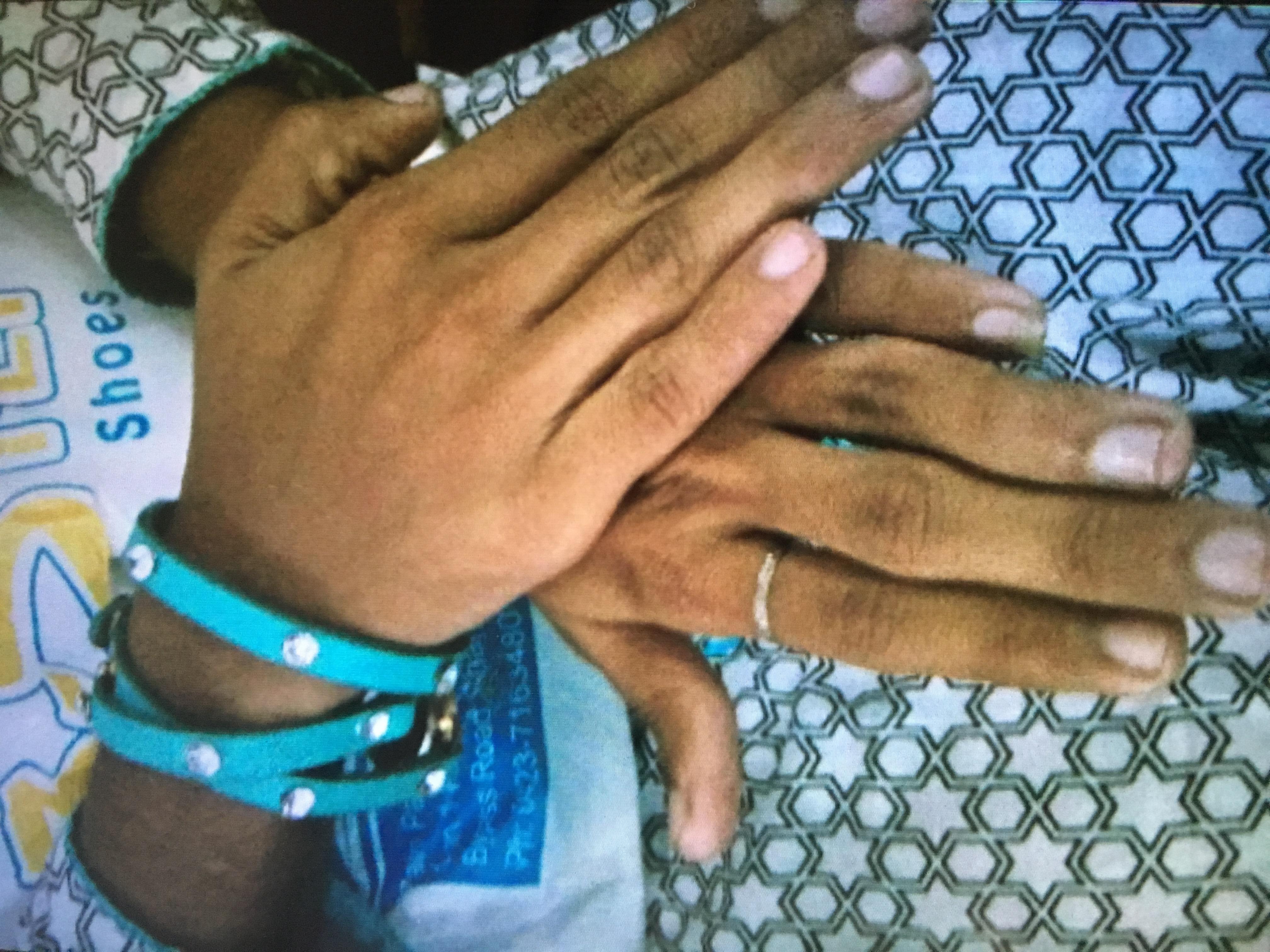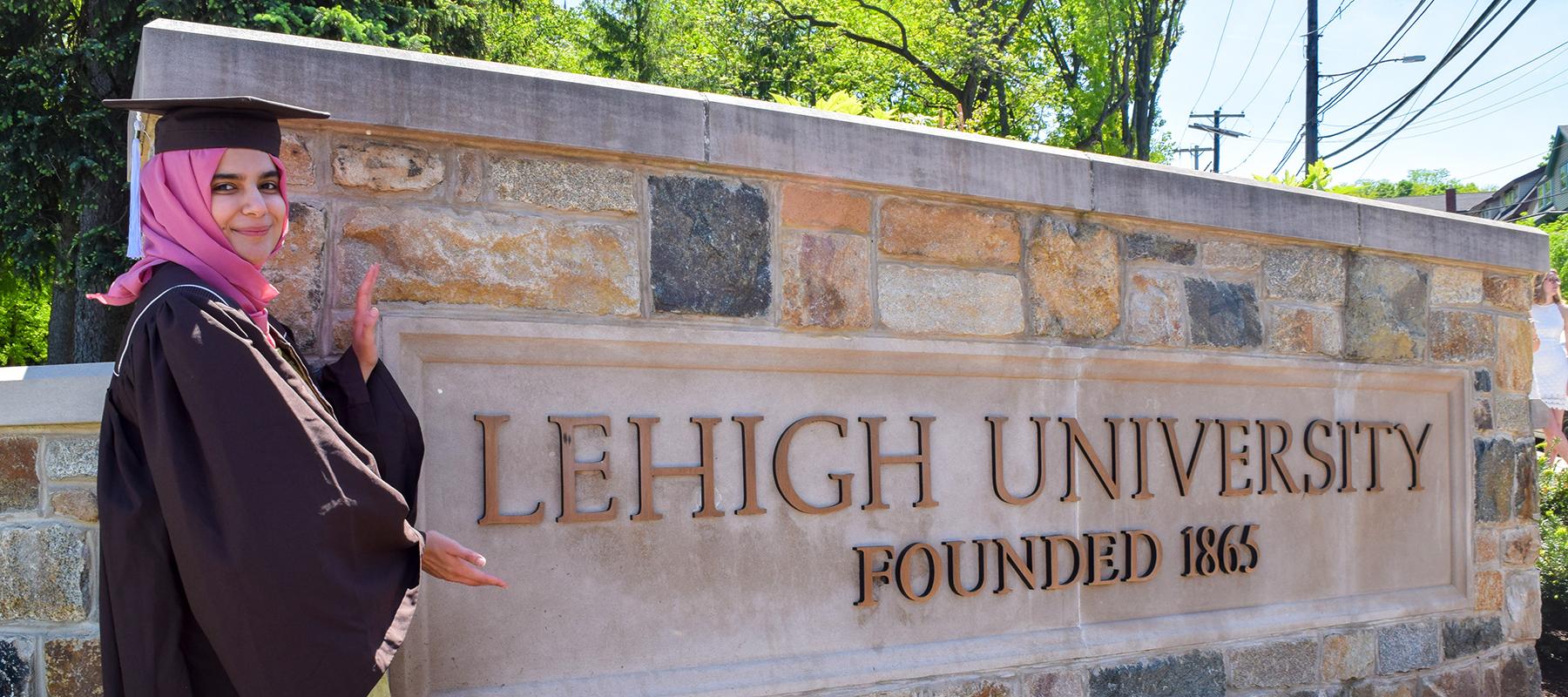Maryam Khan ’19 ’20G has a bold vision: She wants every person to have access to adequate medical care, regardless of their socioeconomic status or the country they call home.
It’s an issue that has always concerned her.
“Growing up, I saw the huge disparities in healthcare,” she says. “When I visited my grandmother in Pakistan, I would play with the children of her household help. I felt so guilty that they couldn’t access what I could.”
Khan got a closer look at the issue when she became a UN Youth Representative during her sophomore year through the Lehigh University-United Nations Partnership. Khan represented CLAN – Caring and Living as Neighbours – an Australian NGO that helps children with chronic health conditions in resource-poor countries enjoy a quality of life on par with that of children in wealthier countries. In addition to serving as a voice for CLAN at the UN, Khan helped out at their offices in Karachi, Pakistan, during her school breaks.

Real-World Experience Brings Perspective
Among other initiatives, CLAN supports children with congenital adrenal hyperplasia (CAH), a genetic disorder that affect how the adrenal glands produce hormones. In many cases, CAH results in lack of cortisol and overproduction of androgens, or male sex hormones like testosterone. With access to regular medication and quality healthcare, children with CAH can live happy, healthy lives. But in Pakistan, very few newborns are screened for genetic illnesses like CAH, and many families struggle to afford the medicine and care they need to manage the disorder. In Karachi, Khan helped the CLAN staff with language translation and led workshops for girls with CAH.
“The excess testosterone produced by CAH causes effects like a deeper voice and a lot of body hair, so these girls were very self-conscious,” says Khan. “When I walked into the room, they would cover their faces so I wouldn’t see their hair, or write their name down because they didn’t want me to hear their voice. Some of them had stopped going to school. But these were 12- and 13-year-old girls, who needed to make friends, get an education and learn about the opportunities for them in the world.”
Khan ran her workshops over the summer and then came back to Lehigh for the next semester. When she returned to the CLAN offices in Karachi several months later, she says the girls were more confident and outgoing. Thanks to CLAN’s support, they were going to school again. “One girl even told me she wants to be an engineer too and asked me about different courses of study,” she says.
Khan says that being a Youth Representative showed her what she could do with her education. She saw the impact she could have on people who needed help, and she learned how to hold her own with ambassadors, diplomats and other leaders. In addition to the work she did with CLAN in Pakistan, she provided the organization with working frameworks that other NGOs used successfully, helped coordinate funding efforts and served as their voice on the UN platform. She even had a chance to speak before the UN General Assembly.

But her experience as a Youth Rep also showed her the complexities of delivering healthcare in developing countries.
“I realized I needed to know statistics, and understand the financial aspects of healthcare and the social implications of different approaches,” she says. She added minors in computer science and economics to her bioengineering major, and she sought out more real-world experiences. She spent a summer in Ireland working as a lab intern through the Iacocca International Internship Program, and she interned at the pharmaceutical company AstraZeneca.
Eventually, Lehigh’s Office of Fellowship Advising approached Khan about applying for a Rhodes scholarship, which funds graduate study at Oxford University. Khan was already pursuing an M.S. in bioengineering at Lehigh, and at first, she didn’t see the need for a second master’s degree.
Giving Back to Pakistan
“Coming to the U.S. for my education, I always wanted to give back to Pakistan in some way,” she says. “Being a UN Youth Representative let me do that because the NGO I represented is based in my hometown. But I wanted to do more.”
In order to do that, she realized she still had more to learn.
“In Pakistan, different parts of the health care system are not connected, and the lack of collaboration leads to poor outcomes for people. I decided to apply for the Rhodes scholarship to study epidemiology. I wanted study the social factors that contribute to the spread of disease, especially polio – Pakistan is one of only three countries where polio is still endemic – and to learn how I could change health policy.”
Applying for the Rhodes is a complex process. Khan went through a series of mock interviews and met with officials at Pakistan’s National Institute of Child Health, Jinnah Hospital and Aga Khan University Hospital, as well as an executive at the pharmaceutical company Sanofi and leaders of other NGOs.
Khan was a finalist for the Rhodes, and while she ultimately did not receive the scholarship, she says the process itself was rewarding.
“It was incredible to exchange ideas with these people and ask: Do my ideas make sense? Do you think this is possible?” she says. “They told me to go for it – I might not get there, but it’s worth pursuing. It was such a privilege and it validated the years I put into my education.”
For now, Khan is returning to her plans to use data science to make the process of developing new drugs more efficient, ultimately making medicines more affordable and accessible to those in need. When she finishes her master’s program this spring, she is going to work in a rotation program at AstraZeneca that includes postings in data science, cyber security and laboratory research. It’s yet another opportunity to gain the sort of knowledge that will help her reach her ultimate goal.
“The corporate experience in the pharmaceutical industry will help me get familiar with the process of working with NGOs to distribute medicine in developing countries,” she says.
“I’m still invested in doing something for Pakistan. I am going to do what I can to give back to my country and help people access the care they need.”
